PEP六年级英语知识点总结
人教版PEP三起小学英语六年级上册知识点总结

人教版PEP三起小学英语六年级上册知识点总结Unit1 How can I get there?一、重点单词和短语Science科学museum博物馆post office邮局bookstore书店cinema电影院hospital医院tasty美味的,可口的London Eye伦敦眼stomach胃crossing十字路口turn left/turn right向左/右转go straight=walk straight直走next to紧挨着/与……相邻far from(离……远)near在……附近behind(在……后面)in front of(在……前面)between…and…(在…和…之间)二、重点句子1.How do you go to school? 你是怎样去上学的?2.where is the restaurant? 餐馆在哪里?3. Usually I go to school on foot. 我通常走路去上学。
4. Sometimes I go by bike. 有时候我骑自行车去。
5.问路之前,出于礼貌,我们要说“Excuse me”与后面的句子要用标点符号隔开。
6.Look at the traffic lights, remember the traffic rules. 看着交通灯,记住交通规则。
7.Stop at a red light.Wait at a yellow light. Go at a green light.红灯停。
黄灯等一等。
绿灯行。
8.Red means stop, yellow means wait, green means go. 红色的意思是停止,黄色的意思是等待,绿色的意思是通行。
9.How can I get to the park? 我该怎样到达公园呢?10.You can go by the No.15 bus. 你可以坐15路公交车去。
六年级英语上册(PEP版)Unit 4必备知识点

六年级英语上册(PEP版)Unit 4 l have a pen pal必备知识点六年级英语上册(PEP版)Unit 4 "I have a pen pal"的必备知识点主要包括以下几个方面:一、重点单词和短语1. pen pal:笔友2. hobby:爱好3. dancing:跳舞(动词ing形式)4. singing:唱歌(动词ing形式)5. reading stories:读故事6. playing football:踢足球7. doing kung fu:练功夫8. cooking Chinese food:烹饪中国食物9. studying Chinese:学习汉语10. doing word puzzles:猜字谜11. going hiking:去远足12. idea:主意13. lives in:住在……(后接地点)14. on a farm:在一个农场里15. write an email to:给……写封电子邮件16. on the playground:在运动场上二、重点句型1. 询问某人的爱好:What are sb's hobbies? 某人的爱好是什么?(sb's表示某人的,hobbies是hobby的复数形式)He/She likes reading stories and singing. 他/她喜欢读故事和唱歌。
注意:在回答时,如果主语是第三人称单数,like要变为likes,动词要用其ing形式。
2. 一般疑问句:Does he/she live in +某地? 他/她住在某地吗?肯定回答:Yes, he/she does.否定回答:No, he/she doesn't.Does he/she like doing sth.? 他/她喜欢做某事吗?肯定回答:Yes, he/she does.否定回答:No, he/she doesn't.3. 表达想要做某事:Do you want to +动词原形(+其他)? 你想要做某事吗?例如:Do you want to learn about robots? 你想要了解机器人吗?4. 征求意见:Shall we +动词原形(+其他)?我们……好吗?例如:Shall we dance? 我们跳舞好吗?三、语法点1. 动词的ing形式:用于表示正在进行的动作或习惯、爱好等。
新版pep六年级上册英语各单元知识点总结
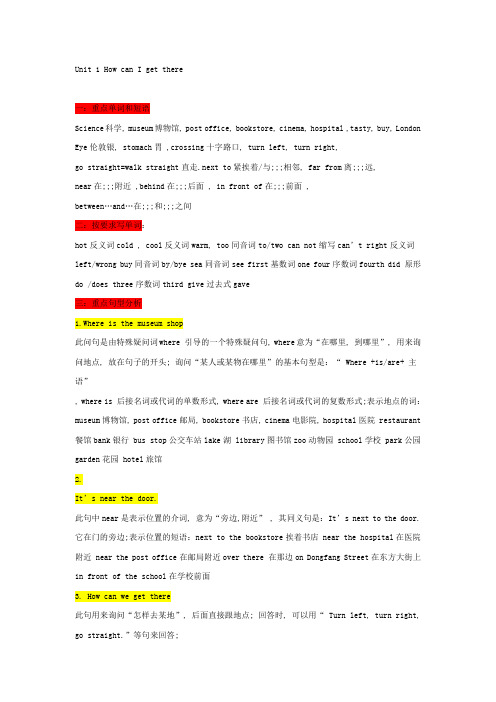
Unit 1 How can I get there一:重点单词和短语Science科学, museum博物馆, post office, bookstore, cinema, hospital ,tasty, buy, London Eye伦敦银, stomach胃 ,crossing十字路口, turn left, turn right,go straight=walk straight直走.next to紧挨着/与;;;相邻, far from离;;;远,near在;;;附近 ,behind在;;;后面 , in front of在;;;前面 ,between…and…在;;;和;;;之间二:按要求写单词:hot反义词cold , cool反义词warm, too同音词to/two can not缩写can’t right反义词left/wrong buy同音词by/bye sea同音词see first基数词one four序数词fourth did 原形do /does three序数词third give过去式gave三:重点句型分析1.Where is the museum shop此问句是由特殊疑问词where 引导的一个特殊疑问句, where意为“在哪里, 到哪里”, 用来询问地点, 放在句子的开头; 询问“某人或某物在哪里”的基本句型是:“ Where +is/are+ 主语”, where is 后接名词或代词的单数形式, where are 后接名词或代词的复数形式;表示地点的词:museum博物馆, post office邮局, bookstore书店, cinema电影院, hospital医院 restaurant 餐馆bank银行 bus stop公交车站lake湖 library图书馆zoo动物园 school学校 park公园garden花园 hotel旅馆2.It’s near the door.此句中near是表示位置的介词, 意为“旁边,附近” , 其同义句是:It’s next to the door.它在门的旁边;表示位置的短语:next to the bookstore挨着书店 near the hospital在医院附近 near the post office在邮局附近over there 在那边on Dongfang Street在东方大街上in front of the school在学校前面3. How can we get there此句用来询问“怎样去某地”, 后面直接跟地点; 回答时, 可以用“ Turn left, turn right, go straight.”等句来回答;同义句:1.Can you tell me the way to+地点2.Where is the +地点3.Which is the way to +地点4.Turn left at the bookstore. Then turn right at the hospital.此句是指路的句型; 常用到的句型有:turn left, 向左转turn right, 向右转go straight直着走;同时表示在某处的介词用at.5.Is the Thames far from hereNo, it isn’t.此句是个be动词开头的一般疑问句, 其回答要用Yes或No. 句中的far from意为“离……远”;反义词组为next to.Unit 2 Ways to go to school一:重点单词和短语on foot步行, by bus =take a bus 乘公交车 by plane,乘飞机 by taxi 乘出租车by ship乘船 by subway 乘地铁by train乘火车 by bike骑自行车by ferry 乘轮渡Hooray好极了slow down 慢下来, stop 停 wait等 pay attention to注意 cross the road 横穿马路 traffic light通信号灯at home在家 missedmiss的过去式想念different,不同chopsticks,筷子复数cross穿过look right向右看 same 相同的door门look at朝;;;看play with和;;;一起玩二:按要求写单词:go 反义词come foot复数feet child复数childrenearly反义词late good反义词bad坏 take带走反义词bring拿来slow反义词quick/fast go 过去式went do过去式 diddo第三人称单数 doesgo第三人称单数 goessame 相同的反义词different不同的miss过去式 missedwrong 错误反义词right正确 can否定形式can’t三:重点句型分析1.How do you come to school你们怎么来学校的此问句是由特殊疑问词how引导的特殊疑问句, 用于询问对方的出行方式; 回答时要根据具体情况作答;表示地点的词:Germany德国 Munich慕尼黑 England英国 Australia澳大利亚school学校 the park 公园the cinema电影院 the hospital医院 the post office邮局the bus stop公共汽车站 home家2.Usually, I come on foot.=Usually, I walk.通常情况下,我步行来;此句是对出行方式的回答句; 其中usually意为“通常”, 表示频率很大, on foot意为“步行”; 一般用by表示出行方式; By后面一定要直接加交通工具的单数形式, 只有“小脚丫”foot与on 搭配, “步行”用on foot表示;3.I must pay attention to the traffic lights.我必须注意交通信号灯; Must是情态动词,意为“必须”后面跟动词原形;动作词组:wear a helmet戴头盔 pay attention to the traffic lights注意交通信号灯look right向右看4.Don’t go at the red light别闯红灯此句是Don’t开头的否定祈使句, don’t后面跟动词原形;意为“不要做某事”;动作词组:run跑 go at the red light闯红灯 touch the door触摸门Eg. Don’t smoke.不要吸烟;/禁止吸烟;Don’t take photos.禁止拍照;5We must look right before crossing the road.我们在横穿马路前必须看看右边;此句中must是情态动词, 意为“必须”后面跟动词原形, 在此句中before是一个介词, 而介词后面跟动词-ing形式;6. There is no door on the bus.公共汽车上没有门;此句是there be句型的单数句, be动词要根据后面名词的单复数形式来决定, 名词为单数或不可数名词就用there is, 名词为复数就用there are. 此句中no door意为“没有门”, 表示单数含义,因此要用there is开头;Unit 3 My weekend plan一:知识点小结重点单词和短语visit拜访film电影 see a film看电影 trip旅游take a trip去旅游supermarket, 超市evening晚上,傍晚 tonight在今晚tomorrow明天next week下周dictionary 字典comic 滑稽的comic book连环画册word book单词本postcard明信片learn 学习teach教disturb打扰 without没有pool池子 jump in跳进 remember记住 lesson 课space太空 travel尤指长途旅游 half一半 price 价格moon月亮make a snowman 堆雪人share sth事 with sb人和某人分享某物lots of= a lot of 许多二:按要求写单词look for 同义词 find leaf 复数 leaves picture 复数 picturessee 同义词 watch/look film 同义词 movie buy 反义词 sellam /is /are 原形 be is /am 复数are this 反义词 thatgoing 原形 go swim 现在进行时swimming can否定形式can’ttoo同音词 two /to clothe复数clothes ice-skate现在进行时ice-skating autumn同义词 fall autumn反义词spring teach 反义词 learn三:重点句型分析1.---What are you going to do tomorrow---I’m going to have an art lesson.此句是个一般将来时态的特殊疑问句; 用了be going to 结构; “be going to +动词原形”构成一般将来时态, 表示计划、安排将要做的事或根据目前推测将要发生的动作, 意为“打算, 将要”;表示时间的单词:evening晚上,傍晚 tonight在今晚tomorrow明天next week 下周this morning今天早晨 this afternoon今天下午 this evening 今天晚上 this weekend 下周末动词短语原形:make a snowman 堆雪人 take a trip去旅游see a film看电影 visit my grandparents 拜访祖父母watch TV看电视learn how to swim学怎样游泳go skating去滑冰row a boat划船go fishing 去钓鱼 go skiing去滑雪 go shopping去购物 make mooncakes做月饼 read a poem读诗eg: I’m going to make a snowman.我打算去堆雪人;We’re going fishing.我们打算去钓鱼;2.We are going to draw some pictures in Renmin Park.此句是be going to 结构的肯定句式; 基本结构为:主语+ be going to +动词原形+表示将来的时间;Some一些,用于肯定句中, 后接可数名词的复数形式或不可数名词, 而在疑问句或否定中表示一些要用any;3---Where are you going---We’re going to the cinema.此句是where 引导的一般将来时态的特殊疑问句, where意为“哪里”, 它是对地点提问的特殊疑问词, 因此回答时要回答一个具体的地点;表示地点的词:school学校 park 公园 cinema电影院 hospital医院 post office邮局 bus stop公共汽车站 home家 supermarket超市museum博物馆, bookstore书店 , restaurant餐馆bank银行lake湖 library图书馆zoo动物园park公园garden花园 hotel旅馆4---When are you going---Next Monday.此句中when意为“什么时候, 何时”, 它引导的疑问句用来对年、月、日等时间进行提问; 如:---When do you go to school in the morning---At 8:00.5---How can you learn to swim without going to a pool此句是由how 引导的特殊疑问句, 询问别人做事的方式、方法; 句中的can 意为“能够”, 是情态动词,后面跟动词原形; “learn to do something,”学习做某件事, 一般表示还没学或还没做的事情,含义将来的意思;第四单元Unit 4 I have a pen pal一、重点单词和短语pen pal笔友hobby爱好 idea主意studies学习第三人称单数 puzzle谜语hiking徒步旅行forest森林 gift礼物 sometimes有时 angry,生气shout大喊 bushy浓密的 have to不得不get … from…,从;;;得到;;;reading books 读书read stories读故事 do kung fu练功夫 play sports 进行体育运动play the pipa 弹琵琶climb mountains爬山 listen to music听音乐 sing English songs 唱英文歌fly kites放风筝 on a farm在一个农场里 write an e mail to 给;;;写封电子邮件 on the playground在运动场上六 live in住在;;;按要求写单词二、按要求写单词have第三人称单数 has do三单形式does do 否定形式don’tdoes 否定形式doesn’t like 三单形式likes he 所有格形式 histalk动词-ing形式 talking hobby三单形式hobbies story三单形式 stories read三单形式 reads live三单形式 lives swim动词-ing形式 swimmingdo动词-ing形式 doing sing动词-ing形式 singing go动词-ing形式 going teach动词-ing形式 teaching also同义词 too play动词-ing形式 playing student复数students dance动词-ing形式dancing write动词-ing形式writing puzzle复数puzzles hike动词-ing形式 hiking learn动词-ing形式learningfriend复数 friends cook三单形式cooks study三单形式 studiesgo 三单形式goes teach三单形式teaches different反义词 samemake三单形式makes talk 三单形式talks love 三单形式lovessleep三单形式 sleeps let三单形式lets sing三单形式 singsdance 三单形式dances sang 原形sing was原形 is/amthrew原形throw looked原形 look did原形do/does true反义词false三、重点句型分析1.问:What are sb’s hobbies 某人的爱好是什么询问某人的爱好答:主语 +like/likes +动词-ing形式+其他; ;;;喜欢;;;此处是对别人的爱好提问及回答的句型,问句中一般hobby要用复数形式, 因为别人的爱好不只一个, 特别注意hobby一词的复数形式变化规则, 变y为i再加-es;答句是一般现在时态的三单人称的句型; 当主语是第三人称单数时, 后面的动词要用它的第三人称单数形式, 同时like意为“喜欢”, 而喜欢做某事2.结构:like + v-ing 即like 后面跟动词的-ing形式Eg: What are Peter’s hobbies He likes reading stories.动词-ing形式:singing唱歌 dancing跳舞 reading stories 读故事playing football踢足球 doing kung fu 练功夫doing word puzzle猜字谜 go hiking 远足 watching TV看电视 drawing pictures 画画listening to music听音乐going fishing 钓鱼3、Does he live in SydneyNo, he doesn’t.此句是助动词does开头的一般疑问句; 其回答要根据助动词和主语来决定;结构为“Does+ 三单人称+ 动词原形”, 肯定回答结构: Yes, 主语+ does, 否定回答结构: No, 主语+ doesn’t. 4、So he doe sn’t like Zac’s music.此句是含有实意动词的否定句, 其结构为:主语+ don’t/ doesn’t+ 动词原形+其他; 当主语是第三人称单数时, 后面的否定助动词要用doesn’t而不是don’t;Unit 5 What does he do 知识点总结一:重点单词和短语factory工厂 worker,工人postman,邮递员businessman商人 police officer警察fisherman 渔民 scientist,科学家pilot飞行员 coach教练job工作, tamer驯服手 dangerous危险farmer农民 honey蜂蜜 stung叮 assistant助手接待员cracker骇客解密高手 nuts果仁think of考虑/有;;;想法go to work去工作 study hard努力学习 stay healthy保持健康 go home 回家 lots of许多 go to the camp去度假营 be good at擅长;;;head teacher校长二:按要求写词语do三单 does work三单 works he主格 his所有格 him宾格she主格 her宾格或所有格 business名词 businessmanfish名词 fisher can 否定形式can’t drive 名词driver teach 名词teacher country复数countries clean名词cleaner write 名词writer sing名词singer dancer 动词dance player 动词 play worker动词 work is否定形式isn’tgo现在分词 going see三单 sees big 反义词smalltall 反义词short thin反义词 fat/strong short 反义词tall/longsea同音词 see lots of =a lot of has 原形havehealthy名词 health life 动词live hard反义词 easy stay三单 stays study 三单studies science名词 scientist university复数 universities those反义词 thesedifferent 反义词same like三单 likes go三单 goes want三单 wants run现在分词 running report 名词reporter use现在分词 using quick 副词quickly they主格 them宾格 their所有格 children 单数child didn’t 否定形式don’t /doesn’t unusal 反义词usual dangerous 反义词safe farm名词 farmer test名词 tester eat 现在分词eating have三单has三:重点句型分析1.What does he doHe’s a businessman.这是一个询问职业的句型, 它的构成是“ What do/ does+某些人+do”, 可以用“某人+ be+a/an+职业名词”来回答; 询问职业还有一个句型是“ What + be+某人”; 如上面的句子还可以说“ What is he ”;表示职业的词:worker工人 postman邮递员businessman商人coach教练police officer警察 fisherman渔民 scientist,科学家pilot飞行员tamer驯服手farmer农民assistant助手接待员teacher老师 cleaner清洁工doctor医生nurse护士 dentist牙医 tailor裁缝 salespersons售货员 pianist钢琴家2 .---Where does he work---He works at sea.当你想询问他人在哪儿工作时, 用“ Where do/ does+ 某些人+ work”这个句型; 我们通常用一个表示地点的介宾短语来回答这个句型; 介宾短语是由介词加上名词或代词构成的;表示地点的介词短语:at a university 在一所大学in a gym在一个体育馆at sea 在海上on a boat在船上 at the zoo在动物园 in a school 在一所学校in a car company在一家汽车公司 in a bank在一家银行3. ---How does he go to work---He goes to work by bike.要询问别人的上班方式, 可以用“ How do/ does+人物+ go to work”句式来询问, 回答时要用到”by+交通工具的单词“或者是on foot;表示交通方式的词: by the No.15 bus乘15路公交车on foot步行,by bus 乘公交车 by plane,乘飞机 by taxi 乘出租车by ship乘船by subway 乘地铁bytrain乘火车 by bike骑自行车by ferry乘轮渡4. What a great job此句是由“what”引导的感叹句:“what”意为“多么”用作定语,修饰名词被强调部分,单数可数名词前要加不定冠词a/an,复数可数名词或不可数名词前不用冠词;这类句子的结构形式是:What+a/an+形容词+名词+主语+谓语+it is. 如:What a clever girl she is多么聪明的姑娘呀Unit6 How do you feel一:重点单词和短语Angry生气afraid害怕 sad伤心worried担心 happy快乐see a doctor看医生wear穿 more,更多deep身 breath呼吸 take a deep breath深呼吸count to ten 数到十popcorn爆米花make,制作wait等check检查planted种植的过去式grow生长或成长a little worried有一点点担心be angry with…与;;;生气be afraid of ;;;害怕;;;domore exercise做更多的运动 wear warm clothes穿暖和的衣服 get some drinks 拿一些饮料 have some popcorn 吃一些爆米花chase the mice追赶老鼠二:按要求写词语First基数词one chase 三单chases mice单数 mouse chase 现在分词chasing these 反义词those these单数 this sad反义词 happy here反义词 there can’t 肯定形式can can’t 完全形式can not don’t完全形式 do not feel 三单feels friends 单数friend suggestions单数 suggestion warm 反义词cool cold 反义词hot clothes单数clothe much 比较级more worry形容词worried sunny名词 sun hears 动词原形hear say 三单says strong反义词thin strong 近义词fat should否定形式shouldn’t picture复数 pictures ant复数 ants tell反义词 retell hungry反义词 full bad 反义词good ill 反义词 healthy making原形 make doing 原形do planted 原形plant plant 动词过去式 planted waiting动词原形 wait三:重点句型分析1.They are afraid of him.此句中be afraid of 意为“ 害怕某人”; 例如: I am afraid of my maths teacher. 我害怕我的数学老师;2.The cat is angry with them.此句中be angry with意为“ 对某人生气”;例如: I broken the cup. My mother is angry with me. 我打碎了杯子; 妈妈对我很生气;3.What’s wrong此句用于询问对方有什么问题或有什么不顺心的事情, 意为:怎么啦出什么事了例如:A: What’s wrong, Jim 吉姆,你怎么啦B: Maybe I am ill. 也许我病了;4.He should see a doctor this morning建议某人应该做某事的句型此句中should 为情态动词,表示“应该,应当”;此句用来给别人提建议;例如:He should work harder. 他应该更加努力;You should help your mother with the housework. 你应该帮你母亲做家务;5. What are you doing此句是现在进行时态的特殊疑问句, 其基本结构为:疑问词+be+主语+其他例如:What is he doing now回答:He is swimming.肯定句结构为:主语+be+动词-ing形式+其他.例如:We are running now。
新版PEP小学英语六年级上册1-6单元知识点总结
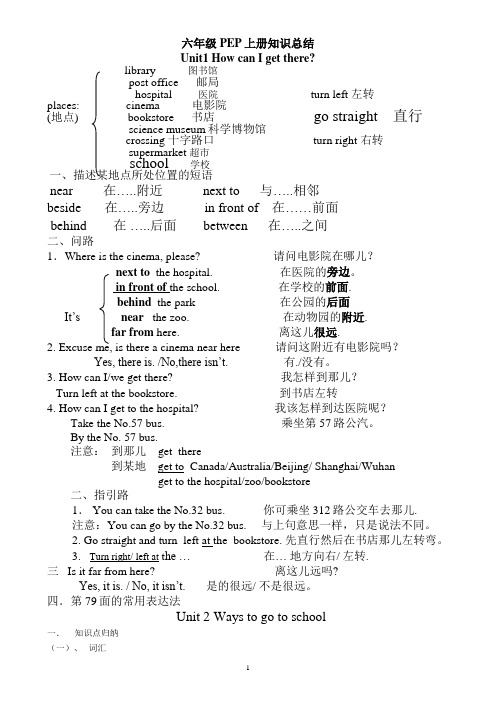
六年级PEP上册知识总结Unit1 How can I get there?library 图书馆post office 邮局hospital 医院turn left 左转places: cinema 电影院(地点) bookstore 书店go straight 直行science museum科学博物馆crossing 十字路口 turn right 右转supermarket 超市school 学校一、描述某地点所处位置的短语near 在…..附近 next to 与…..相邻beside 在…..旁边 in front of 在……前面behind 在…..后面 between 在…..之间二、问路1.Where is the cinema, please? 请问电影院在哪儿?next to the hospital. 在医院的旁边。
in front of the school. 在学校的前面.behind the park 在公园的后面It’s near the zoo. 在动物园的附近.far from here. 离这儿很远.2. Excuse me, is there a cinema near here 请问这附近有电影院吗?Yes, there is. /No,there isn’t. 有./没有。
3. How can I/we get there? 我怎样到那儿?Turn left at the bookstore. 到书店左转4. How can I get to the hospital? 我该怎样到达医院呢?Take the No.57 bus. 乘坐第57路公汽。
By the No. 57 bus.注意:到那儿 get there到某地 get to Canada/Australia/Beijing/ Shanghai/Wuhanget to the hospital/zoo/bookstore二、指引路1. You can take the No.32 bus. 你可乘坐312路公交车去那儿.注意:You can go by the No.32 bus. 与上句意思一样,只是说法不同。
(完整word版)pep六年级上册英语-各单元知识点总结
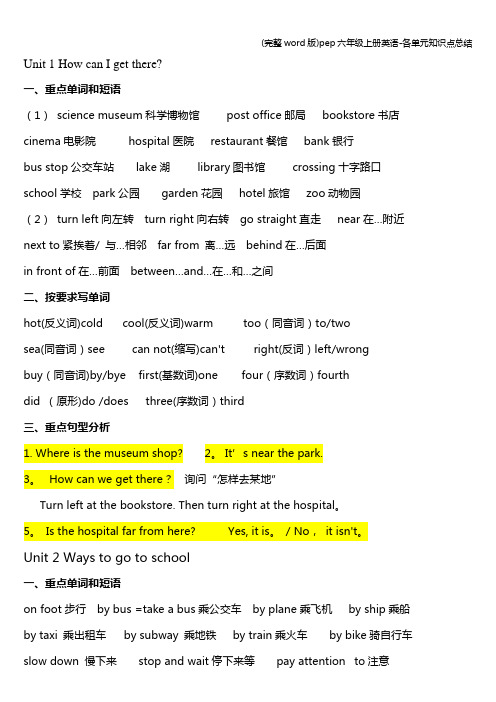
Unit 1 How can I get there?一、重点单词和短语(1)science museum科学博物馆post office邮局bookstore书店cinema电影院hospital医院restaurant餐馆bank银行bus stop公交车站lake湖library图书馆crossing十字路口school学校park公园garden花园hotel旅馆zoo动物园(2)turn left向左转turn right向右转go straight直走near在…附近next to紧挨着/ 与…相邻far from 离…远behind在…后面in front of在…前面between…and…在…和…之间二、按要求写单词hot(反义词)cold cool(反义词)warm too(同音词)to/twosea(同音词)see can not(缩写)can't right(反词)left/wrongbuy(同音词)by/bye first(基数词)one four(序数词)fourthdid (原形)do /does three(序数词)third三、重点句型分析1. Where is the museum shop? 2。
It’s near the park.3。
How can we get there?询问“怎样去某地”Turn left at the bookstore. Then turn right at the hospital。
5。
Is the hospital far from here? Yes, it is。
/ No,it isn't。
Unit 2 Ways to go to school一、重点单词和短语on foot步行by bus =take a bus乘公交车by plane乘飞机by ship乘船by taxi 乘出租车by subway 乘地铁by train乘火车by bike骑自行车slow down 慢下来stop and wait停下来等pay attention to注意cross the road横穿马路traffic light通信号灯at home在家look right向右看look at朝…看play with和…一起玩二、按要求写单词go (反义词)come foot(复数)feet child(复数)childrenearly(反义词)late good(反义词)bad take(反义词)bringslow(反义词)quick/fast go(过去式)went do(过去式)diddo(第三人称单数) does go(第三人称单数)goessame 相同的(反义词)different不同的miss(过去式)missedwrong 错误(反义词)right正确can(否定形式)can’t三、重点句型分析1。
人教版(PEP)六年级英语上册期末复习知识点

人教版(PEP)六年级英语上册期末复习知识点人教版(PEP)六年级英语上册复习知识点Unit 1 How can I get there?主要单词:science科学museum博物馆post office邮局bookstore书店cinema电影院hospital医院crossing十字路口turn转弯left 向左ask问interesting有趣的Italian意大利restaurant餐馆pizza 比萨饼street大街;街道get到达GPS全球卫星定位系统feature特点follow跟着far较远的tell告诉习惯搭配turn left向左转turn right向右转go straight直行in front of...在...前面next to挨着go straight直走near the park在公园附近on Dongfang Street在东方大街上post office邮局pet hospital 宠物医院Beihai Park北海公园Italian restaurant意大利餐馆Palace Museum故宫博物院science museum科学博物馆主要句子:☆1、☆Where is the museum shop?博物馆的市肆在哪儿?☆☆2、It’s near the door.在大门附近。
☆☆3、How can we get there?我们怎么到那儿?☆☆4、Turn left at the bookstore.在书店左转。
☆5、I want to buy a postcard.我想买一张明片。
6、I’ll ask.我去问问。
7、Wow, a talking robot!哇!一个讲话机器人。
8、What a great museum!好棒的一家博物馆!10、There is a pet hospital in my city.在我的城市有一家宠物医院。
11、Wu Yifan and Robin are looking at some robots.吴一凡和罗宾正在看一些机器人。
新版PEP小学英语六年级上册1-6单元知识点总结
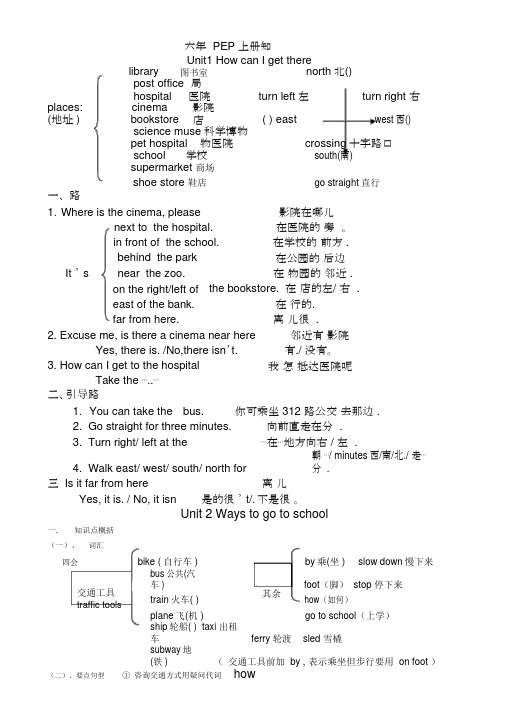
六年 PEP 上册知Unit1 How can I get therelibrary图书室north北()post office 局hospital医院turn left左turn right 右places:cinema影院( ) east west西() (地址 )bookstore店science muse科学博物crossing十字路口pet hospital 物医院school学校south(南)supermarket 商场一、路shoe store 鞋店go straight直行1.Where is the cinema, please影院在哪儿next to the hospital.在医院的旁。
in front of the school.在学校的前方 .behind the park在公园的后边It ’ s near the zoo.在物园的邻近 .on the right/left of the bookstore. 在店的左/ 右 .east of the bank.在行的.far from here.离儿很 .2. Excuse me, is there a cinema near here邻近有影院Yes, there is. /No,there isn’t.有./ 没有。
3. How can I get to the hospital我怎抵达医院呢Take the ⋯..⋯二、引导路1. You can take the bus.你可乘坐 312 路公交去那边 .2. Go straight for three minutes.向前直走在分 .3. Turn right/ left at the⋯在⋯地方向右 / 左 .4. Walk east/ west/ south/ north for 朝⋯/ minutes西/南/北./ 走⋯分 .三 Is it far from here离儿Yes, it is. / No, it isn是的很’ t/.不是很。
pep六年级下册英语知识点归纳总结

pep六年级下册英语知识点归纳总结一、单词拼写常见规律:1. 以e结尾的单词,变成复数形式时,先去掉e再加s;2. 以辅音字母+y结尾的单词,变成复数形式时,先把y变i再加es;3. 以o结尾的单词,变复数形式时,大部分直接加es。
二、基数词和序数词1. 基数词:表示数量的词,例如:one, two, three等;2. 序数词:表示顺序的词,例如:first, second, third等。
三、时态1. 一般现在时:表示经常发生的动作或客观事实;2. 一般过去时:表示过去发生的动作或状态;3. 一般将来时:表示将来发生的动作或计划。
四、句型结构1. 肯定句结构:主语+动词+宾语;2. 否定句结构:主语+do/does/did not+动词+宾语;3. 疑问句结构:特殊疑问词/助动词+主语+动词+宾语。
五、情态动词常见情态动词有can, could, may, might, must, shall, should, will, would等,它们用于表示推测、能力、许可、建议、命令等情态。
六、名词所有格1. 名词所有格:表示所属关系的名词后面加's;2. 表示复数名词所有格:在复数名词后面加';3. 表示以s结尾的复数名词所有格:在复数名词后面加'。
七、形容词和副词1. 形容词:修饰名词,通常放在名词前面;2. 副词:修饰动词、形容词和副词,通常放在所修饰的词后面。
八、比较级和最高级1. 比较级:表示两个或两组人或事物之间的比较,形容词和副词的比较级一般在词尾加er,例如:taller, faster;2. 最高级:表示三个或三组或三者以上的人或事物之间的比较,形容词和副词的最高级一般在词尾加est,例如:tallest, fastest。
九、倍数和分数1. 倍数:使用倍数词+as+形容词原级,例如:twice as heavy as;2. 分数:使用分数词+of+名词,例如:two-thirds of the students。
人教版PEP六年级英语上册知识点汇总
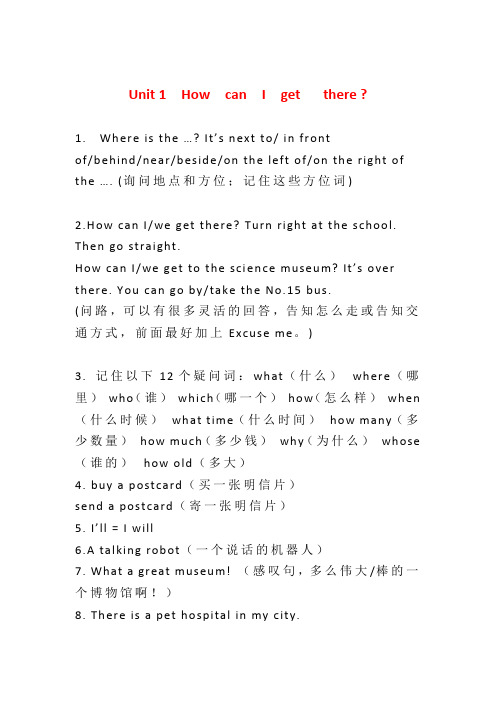
Unit 1 How can I get there ?1. Where is the …? It’s next to/ in frontof/behind/near/beside/on the left of/on the right of the …. (询问地点和方位;记住这些方位词)2.How can I/we get there? Turn right at the school. Then go straight.How can I/we get to the sci ence museum? It’s over there. You can go by/take the No.15 bus.(问路,可以有很多灵活的回答,告知怎么走或告知交通方式,前面最好加上Excuse me。
)3. 记住以下12个疑问词:what(什么)where(哪里)who(谁)which(哪一个)how(怎么样)when (什么时候)what time(什么时间)how many(多少数量)how much(多少钱)why(为什么)whose (谁的)how old(多大)4. buy a postcard(买一张明信片)send a postcard(寄一张明信片)5. I’ll = I will6.A talking robot(一个说话的机器人)7. What a great museum! (感叹句,多么伟大/棒的一个博物馆啊!)8. There is a pet hospital in my city.There are some bookstores in my city.Is there a pet hospital in y our city?Are there any bookstores in my city?(there be句型的单复数、肯定句和一般疑问句形式回忆起来)9. What an interesting film!(感叹句,多么有趣的一部电影啊!)10. Italian restaurant (意大利餐厅)11.yum=yummy12. On Dongfang Street (注意介词)13. work 有多种意思,比如工作;奏效,起作用,需根据上下文来理解。
人教版PEP英语六年级上册知识点归纳

Unit 1 How can I get there?1. 名词: science 科学 museum 博物馆 bookstore 书店 cinema 电影院 hospital 医院 crossing 十字路口2. 动词: turn 转弯3. 副词: left 左 right 右 straight 笔直地4. 短语: post office 邮局1. 名词: sir 先生 restaurant 餐馆 pizza 比萨饼 street 大街;街道 GPS 全球(卫星)定位系统2. 动词: ask 问 feature 特点 get 到达 gave(give 的过去式) 供给;交给 follow跟着tell 告知3. 形容词: interesting 好玩的 Italian 意大利的 far 较远的1. — Where is the cinema? 电影院在哪儿?— It ’ns e xt to the bookstore. 紧挨着书店。
2. How can we get there?我们怎么到那儿?3. Turn left at the bookstore. Then turn right at the hospital.到书店左转。
然后到医院右转。
留意:要留意介词的固定搭配。
Turn left/right at the … 到……左/右转。
Get off at the … 在……下车。
一、核心词汇二、了解词汇三、核心句型It’s on the left/right.在左/右边。
Walk/Go straight for …minutes.步行/直走……分钟。
It’seast/west/south/north of the …在……东/西/南/北边。
It’sfar from the …距离……远。
四、了解句型1.Is there a …?……有……吗?拓展: there be 句型(1)主要用以表达“某处(某时)有某人(某物)”,其根本句型为“There+be 动词+名词+介词短语+其他.”There is a football under the chair. 椅子下面有一个足球。
(完整版)人教版(PEP)小学英语六年级上册复习资料
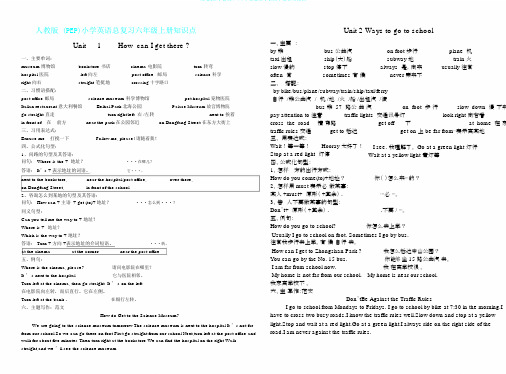
人教版 (PEP)小学英语总复习六年级上册知识点Unit1How can I get there ?一、主要单词:museum 博物馆bookstore 书店cinema 电影院turn 转弯hospital 医院left 向左post office邮局science 科学right 向右straight 笔挺地crossing 十字路口二、习惯语搭配:post office 邮局science museum 科学博物馆pet hospital 宠物医院Italian restaurant 意大利餐馆Beihai Park 北海公园Palace Museum 故宫博物院go straight 直走turn right/left 右 /左转next to 挨着in front of... 在 ...前方near the park 在公园邻近on Dongfang Street 在东方大街上三、习用表达式:Unit 2 Ways to go to school一、主要:by 乘bus 公共汽on foot 步行plane 机taxi 出租ship(大)船subway 地train 火slow 慢的stop 停下always 是,向来usually 往常often 常sometimes 有候never 素来不二、搭配:by bike/bus/plane/subway/train/ship/taxi/ferry自行 /乘公共汽 / 机 /地 /火 /船 /出租汽 /渡bus 乘 57 路公共汽on foot 步行slow down 慢下来pay attention to 注意traffic lights 交通讯号灯look right 向右看cross the road横穿路get off下at home 在家traffic rules 交通get to 抵达get on 上be far from⋯表示离某地Excuse me打搅一下Follow me, please! 请随着我!四、公式化句型:1、问路的句型及其答语:问句: Where is the + 地址?···在哪儿?答语: It’s + 表示地址的词语。
PEP六年级英语上册知识点归纳
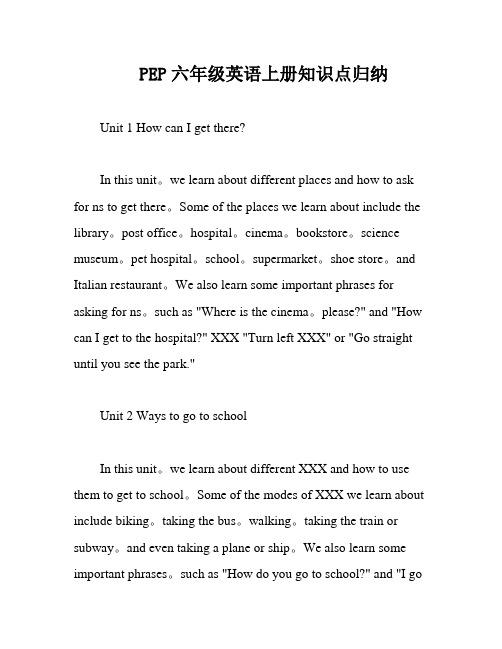
PEP六年级英语上册知识点归纳Unit 1 How can I get there?In this unit。
we learn about different places and how to ask for ns to get there。
Some of the places we learn about include the library。
post office。
hospital。
cinema。
bookstore。
science museum。
pet hospital。
school。
supermarket。
shoe store。
and Italian restaurant。
We also learn some important phrases for asking for ns。
such as "Where is the cinema。
please?" and "How can I get to the hospital?" XXX "Turn left XXX" or "Go straight until you see the park."Unit 2 Ways to go to schoolIn this unit。
we learn about different XXX and how to use them to get to school。
Some of the modes of XXX we learn about include biking。
taking the bus。
walking。
taking the train or subway。
and even taking a plane or ship。
We also learn some important phrases。
such as "How do you go to school?" and "I goto school by bike." We also learn about safety while using different modes of XXX。
人教版pep英语六年级上册必考知识点

人教版PEP英语六年级上册必考知识点随着英语教育的不断发展,学生们对英语学习的要求也越来越高。
英语作为一门重要的外语,对于学生来说,掌握好英语知识是非常重要的。
人教版PEP英语六年级上册作为学生学习的重要教材,其中的必考知识点更是学生们需要重点掌握的内容。
下面就让我们来看一下人教版PEP英语六年级上册的必考知识点。
一、语音知识1. 26个字母的大小写形式及发音。
2. 单词中元音字母的发音规律。
3. 辅音字母C和G的发音规律。
二、词汇知识1. 数字的表达方式及拼写。
2. 一些常见的动词和形容词。
3. 表示时间、日期、星期的词汇。
三、句型知识1. 基本的英语句型及其构成。
2. 肯定句、否定句、一般疑问句的基本结构及变化规律。
3. 一般疑问句的提问词和助动词的使用规则。
四、语法知识1. 英文的基本时态(过去时、现在时、将来时)及其构成规律。
2. 形容词的比较级与最高级的构成和用法。
3. 不定冠词、定冠词和零冠词的用法及其特殊情况。
五、阅读技巧1. 词汇量的积累和理解能力的培养。
2. 对于文章中重点词语和句子的把握以及整体理解能力的培养。
3. 阅读短文时的逻辑思维和推理能力的培养。
六、书写规范1. 英文书写的基本规范和要求。
2. 字母大小写的正确使用。
3. 英文句子的书写结构和标点符号的使用规范。
以上就是人教版PEP英语六年级上册必考知识点的内容。
学生们在学习英语的过程中,要重点掌握以上知识点,扎实基础,提高自己的英语水平。
老师们也要在教学中注重对这些知识点的讲解和强化,帮助学生更好地掌握英语知识,提高学生的英语学习能力。
希望学生们在学习英语的过程中,能够充分利用好教材,努力提高自己的英语水平,为将来的学习和生活打下坚实的基础。
人教版PEP英语六年级上册必考知识点从上面列举的知识点中我们可以看出,英语学习需要学生们全方面的掌握,涉及到语音、词汇、句型、语法、阅读技巧和书写规范等多个方面。
下面我们来进一步深入了解这些知识点,并且提供更多的学习建议。
PEP小学六年级英语重点知识总结归纳
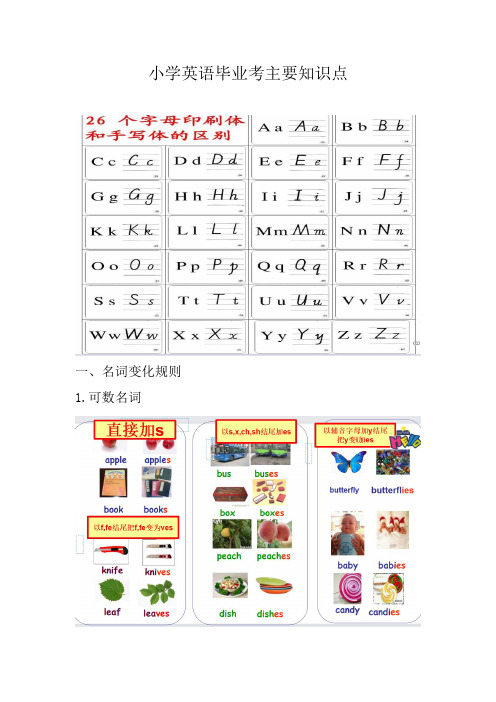
小学英语毕业考主要知识点
一、名词变化规则
1.可数名词
2.不可数名词
二、代词
三、代词(人称代词和指示代词)与be 动词
四、形容词变化规则
五、时态与动词
(1)一般过去式:主语+动词过去式(ed) (主题:过去活动:last weekend)
规则变化
不规则变化
(2)一般将来时态:(主题:计划)
A.主语+be(am,is,are)+going to+ 动词原级
B.主语+Will+ 动词原级
(3)一般现在时态下三单+动词(s/es)
主题:介绍家庭成员给笔友或介绍笔友给家庭成员
同样的方式介绍家庭其他成员
重要语法点:
三单+频度副词+动词s/es
爱好:
三单+likes+动词ing
Does+动词原级
(4)现在进行时态:主语+动词现在分词(V+ing)
二、季节话题
还有天气、颜色、衣服话题可以加入该主题。
新版六年级英语PEP上册知识点总结
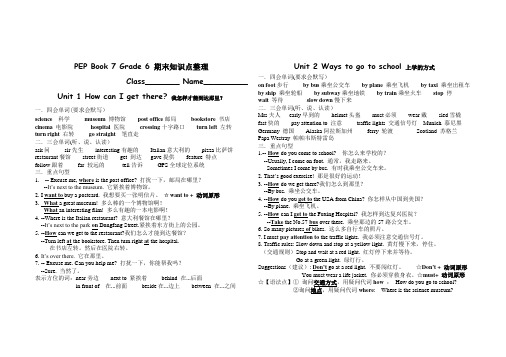
PEP Book 7 Grade 6 期末知识点整理Class_______ Name_________ Unit 1 How can I get there? 我怎样才能到达那里?一.四会单词(要求会默写)science 科学museum 博物馆post office邮局bookstore 书店cinema电影院hospital医院crossing十字路口turn left 左转turn right 右转go straight 笔直走二.三会单词(听、说、认读)ask问sir先生interesting有趣的Italian意大利的pizza比萨饼restaurant餐馆street街道get 到达gave提供feature 特点follow跟着far 较远的tell告诉GPS全球定位系统三.重点句型1. -- Excuse me, where is the post office? 打扰一下,邮局在哪里?--It’s next to the museum. 它紧挨着博物馆。
2.I want to buy a postcard. 我想要买一张明信片。
☆want to + 动词原形3.What a great museum! 多么棒的一个博物馆啊!What an interesting film! 多么有趣的一本电影啊!4.--Where is the Italian restaurant? 意大利餐馆在哪里?--It’s next to the park on Dongfang Street.紧挨着东方街上的公园。
5.--How can we get to the restaurant?我们怎么才能到达餐馆?--Turn left at the bookstore. Then turn right at the hospital.在书店左转。
然后在医院右转。
6.It’s over there. 它在那里。
pep六年级上册1至3单元知识点
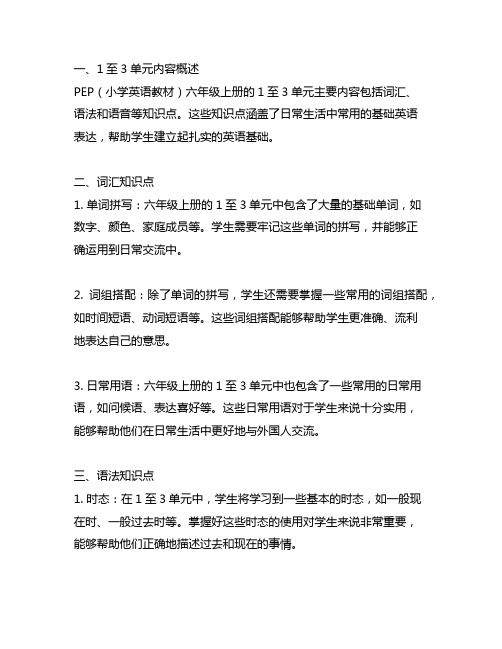
一、1至3单元内容概述PEP(小学英语教材)六年级上册的1至3单元主要内容包括词汇、语法和语音等知识点。
这些知识点涵盖了日常生活中常用的基础英语表达,帮助学生建立起扎实的英语基础。
二、词汇知识点1. 单词拼写:六年级上册的1至3单元中包含了大量的基础单词,如数字、颜色、家庭成员等。
学生需要牢记这些单词的拼写,并能够正确运用到日常交流中。
2. 词组搭配:除了单词的拼写,学生还需要掌握一些常用的词组搭配,如时间短语、动词短语等。
这些词组搭配能够帮助学生更准确、流利地表达自己的意思。
3. 日常用语:六年级上册的1至3单元中也包含了一些常用的日常用语,如问候语、表达喜好等。
这些日常用语对于学生来说十分实用,能够帮助他们在日常生活中更好地与外国人交流。
三、语法知识点1. 时态:在1至3单元中,学生将学习到一些基本的时态,如一般现在时、一般过去时等。
掌握好这些时态的使用对学生来说非常重要,能够帮助他们正确地描述过去和现在的事情。
2. 语法结构:学生还需要掌握一些基本的语法结构,如肯定句、否定句、疑问句等。
这些基本的语法结构是构建语言表达能力的基石,对学生的语言能力提升有着重要的作用。
四、语音知识点1. 发音准确性:在1至3单元中,学生将学习一些基础的英语发音规则,包括元音、辅音的发音技巧等。
通过反复练习,帮助学生提高发音的准确性,使他们能够更加清晰地表达自己的意思。
2. 语音连读:学生还需要学习一些基本的语音连读规则,如连读音、重读音等。
这些规则能够帮助学生更好地理解和模仿地道的英语发音,提高他们的口语表达能力。
五、总结PEP六年级上册的1至3单元涵盖了大量的英语基础知识,包括词汇、语法和语音等方面。
通过系统的学习和练习,学生能够建立起扎实的英语基础,为今后的英语学习打下坚实的基础。
这些知识点也是学生未来学习更复杂英语知识的基础,对于学生的英语学习之路具有重要的意义。
在前面的内容中,我们已经对PEP六年级上册1至3单元的知识点进行了概述,包括词汇、语法和语音等方面。
PEP小学英语六年级上下全册知识点总结
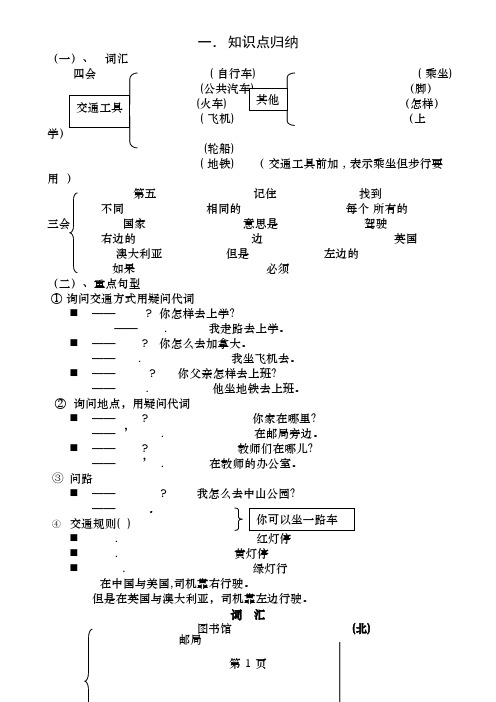
一. 知识点归纳(一)、 词汇乘坐) (脚)火车(怎样) 飞机(上轮船) ( 地铁) ( 交通工具前加 , 表示乘坐但步行要用 )第五 记住 找到不同 相同的 每个 所有的三会 国家 意思是 驾驶右边的 边 英国 澳大利亚 但是 左边的 如果 必须(二)、重点句型① 询问交通方式用疑问代词⏹ —— ? 你怎样去上学?—— . 我走路去上学。
⏹ —— ? 你怎么去加拿大。
—— . 我坐飞机去。
⏹ —— ? 你父亲怎样去上班?—— . 他坐地铁去上班。
② 询问地点,用疑问代词⏹ —— ? 你家在哪里?—— ’ . 在邮局旁边。
⏹ —— ? 教师们在哪儿?—— ’ . 在教师的办公室。
③ 问路⏹ —— ? 我怎么去中山公园?—— .④ 交通规则( )⏹ ⏹ . 黄灯停 ⏹ . 绿灯行在中国与美国,司机靠右行驶。
但是在英国与澳大利亚,司机靠左边行驶。
词 汇图书馆 (北) 邮局医院: 电影院(地点) 书店 (东) (西)科学博物馆银行学校(南)超市鞋店在哪里请与…相邻右边,正确的左边成直线地然后转弯对不起想要双分钟告诉乘坐远放学以后上车下车第十二聚会;晚会开始买句型一、问路. , ? 请问电影院在哪儿?. 在医院的旁边。
. 在学校的前面.在公园的后面’ . 在动物园的附近.. 在书店的左右边.. 在银行的东边.. 离这儿很远.. , 请问这附近有电影院吗?, . 有.. ? 我该怎样到达医院呢?二、指引路. . 你可乘坐路公交车去那儿.. …在…地方上车下车.. . 向前直走在分钟.. …在…地方向右左转.朝东西南北走…分钟.三 ? 离这儿远吗?一.知识点归纳(一)、词汇四会下周报纸今天上午漫画书今天下午杂志(时间 ) 今天晚上字典今夜明信片明天去旅游主题公园买一些水果宠物店(活动)去看电影(其他)水果摊参观长城鞋店阅读有关植物的杂志商店三会:忙碌的一起地需要其他二、重点句式与句型:本单元中出现的一个重点语法项目是一般将来时:表示将要发生的动作或状态,常与表示将来的时间连用。
新版pep六年级上册英语-各单元知识点总结
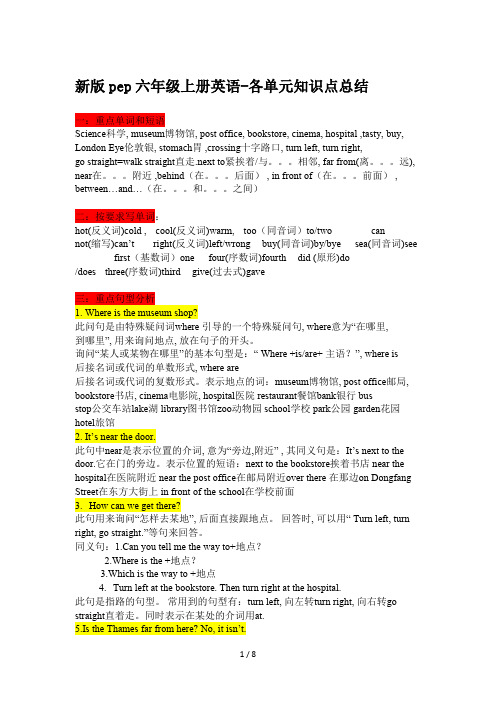
新版pep六年级上册英语-各单元知识点总结一:重点单词和短语Science科学, museum博物馆, post office, bookstore, cinema, hospital ,tasty, buy, London Eye伦敦银, stomach胃 ,crossing十字路口, turn left, turn right,go straight=walk straight直走.next to紧挨着/与。
相邻, far from(离。
远), near在。
附近 ,behind(在。
后面) , in front of(在。
前面) , between…and…(在。
和。
之间)二:按要求写单词:hot(反义词)cold , cool(反义词)warm, too(同音词)to/two cannot(缩写)can’t right(反义词)left/wrong buy(同音词)by/bye sea(同音词)see first(基数词)one four(序数词)fourth did (原形)do/does three(序数词)third give(过去式)gave三:重点句型分析1. Where is the museum shop?此问句是由特殊疑问词where 引导的一个特殊疑问句, where意为“在哪里,到哪里”, 用来询问地点, 放在句子的开头。
询问“某人或某物在哪里”的基本句型是:“ Where +is/are+ 主语?”, where is后接名词或代词的单数形式, where are后接名词或代词的复数形式。
表示地点的词:museum博物馆, post office邮局, bookstore书店, cinema电影院, hospital医院 restaurant餐馆bank银行 busstop公交车站lake湖 library图书馆zoo动物园 school学校 park公园 garden花园hotel旅馆2. It’s near the door.此句中near是表示位置的介词, 意为“旁边,附近” , 其同义句是:It’s next to the door.它在门的旁边。
- 1、下载文档前请自行甄别文档内容的完整性,平台不提供额外的编辑、内容补充、找答案等附加服务。
- 2、"仅部分预览"的文档,不可在线预览部分如存在完整性等问题,可反馈申请退款(可完整预览的文档不适用该条件!)。
- 3、如文档侵犯您的权益,请联系客服反馈,我们会尽快为您处理(人工客服工作时间:9:00-18:30)。
在上面的句子中第一 be 动词的一般过去时态;第二句和第三句属于实义动词的一般过去时态。 ( 1) Be 动词的一般过去时态 在没有实义动词的句子中使用 be 动词, am is 的过去式为 was; ( 2) are 的过去式为 were. 构成:肯定句:主语 +was (were) +宾语如: I was late yesterday.(昨天我 迟到了。)
— eng
六年级下册单元知识点 第一单元
四会单词: tall — talle更r 高的 short — sho更rte矮r 的 strong — stron更ge强r 壮的 old — olde年r 龄更大的
young — youn年g 轻的 big — bigge更r 大的 heavy — heavier更重的 long — longe更r 长的 thin — thinner 更瘦的 small — smalle(r 体型)更小的 四会句型 : How tall are you?你有多高? I ’ m 1 6 4 cm tal我l. 164 厘米高。 You’ re shorter than me你. 比我矮 . You’ re 4 cm talme你. 比我高 4 厘 米。 How heavy are you?你有多重? I am 48 kg. 我 4 8 千克。 应该掌握的知识点:
write — writing ride
— riding make — making dance — dancing
(3)以单元音加单辅音结尾的重读闭音节,要双写最后一个辅音字母,再加
I n g。
run — running swim — swimming put — putting sit 第五单—元sitting
特殊疑问句: 特殊疑问词 +was (were) +主语 +宾语 如: When were you born?你是什么时候出生的?
( 2)实义动词的一般过去时态 肯定句要使用动词的过去式,否定句和疑问句要使用助动词 does的过去式 did. 肯定句为:主语 +动词过去式 +宾语 如: I went home at nine o'clock yesterday(. 我昨天九点钟回的家。 ) 否定句:主语 +didn't +动词原形 +宾语 如: I didn't go home yesterday. (我昨天没回家。 ) 疑问句: Did +主语 +动词原形 +宾语 如: Did you go home yesterday? 你( 昨天回家了吗? ) 肯定回答: Yes, I did. (是的,我回了。 )否定回答: No, I didn't. ( 不,我没回家。 )
第三单元
四会单词: watch — watched看 wash — washe洗d clean — cleane打d 扫 play — played玩 visit — visite看d 望 do — did last weekend上末 go — wen去t go to a park — went to a p去ar公k 园 go swimming — went swimming去游泳 go fishing — went fishing read — read读 go hiking — went hik去in郊g 游
Unit 3 What are you going to do ?
主要单词: this morning /afternoon/ evening今天上午 /下午 /晚上 next week 下周 tonight 今晚 post card明信片 comic book 漫画书 newspaper报纸
主要句子:
1、表示两者之间有所比较时,句子中的形容词要用比较级形式。形容词变为比较级的变化规则:
(1)一般情况下,在形容词的词尾直接加 e r。如 : tall — taller short
— shorter.
(2)以字母 e 结尾的形容词,)以重读闭音节结尾,且结尾只有一个辅音字母的词,先双写这个辅音字母,再加
知识点: 1、this evening 和 tonight 的 区别: this evening 指的是今天晚上睡觉以前的时间,一般指晚上十二点 以前。而 tonight 指的是今晚,一般是指一整晚的时间,通宵。 2、What kind of 什么种类。用来问类别。 如 What kind of fruit do you like? 你最喜欢哪一种水果? 3、I want to be 我…想成为 … 表示理想。 Unit 4 I have pen pal
四会句型: What did you do last weekend? 你上个周末干什么了? I played football. 我踢足球了。 Did you read books?你读书了吗? Yes, I did.是的,我读了。 No, I didn
’不t,. 我没有。
应该掌握的知识点: 1、关于一般过去时 一般过去时态:表示过去某一时间所发生的动作或存在的状态。谓语动词要用一般过去式。经常与 yesterday(昨天) , last week(上周) , last month(上个月) , last year(去年) , two months ago(两个 月前) , the day before yesterday(前天), in 1990 (在 1in those days(在那些日子里)等表示过去的 时间状语连用。 如: I was born in 1990. (我出生在 1990 年)。When did you go to the park?你是什么时候去的公园。 I went to the park last w 是上周去的公园
否定句:主语 +was (were) +not+宾语 如: We weren't late yesterday. 我( 们昨天没迟到 ) 疑问句: Was (Were) +主语 +宾语 如: Were you ill yesterday?(你昨天病了吗?) 肯定回答: Yes, I was. (是的,我病了。 ) 否定句: No, I wasn't. (不,我没病。 )
一些由动词变化而来的职业名词:
teach — teacher clean — cleaner sing — singer dance — dancer drive — driver
write — writer TV report
— TV act — actor act — actress art
— artist engine
Unit 2 Where is the science museum?
主要单词: library 图书馆 post office 邮局 hospital 医院 cinema电影院 bookstore 书店 science museum科技馆 turn left 向左转 turn right 向右转 north 北 south 南 east东 west 西
主要句子: How do you go to school?你怎么去上学? Usually I go to school on foot. Sometimes I go by bus通. 常我步行去上学。 How can I get to Zhongshan Park ?我怎么到达中山公园? You can go by the No. 1bus可. 以坐 15 路公共汽车去。
第二单元:
四会单词 have a fever发烧 have a sore throat喉咙疼 have a cold感冒 have a toothache牙疼 头疼 matter 事情 sore 疼的 hurt 疼痛 nose鼻子 tired 疲劳的,累的 excited 兴奋的 angry 生气的 happy 高兴的 bored 无聊的,烦人的 s 的,悲伤的 四会句型: What’ s the matter怎? 么了? My throat is sore. My nose hurts我. 喉咙疼。我鼻子疼。 How are you, Liu Y u n? You look happy. 你好吗,刘云。你看起来很高兴。 How are you, Sarah? You look sad today你. 好吗, Sarah?今天,你看起来很难过。
What are you going to do on the weekend你? 周末打算做什么? I ’ m going to visit my grandparents this weeken这d? 个 周末我打算去看望我的外祖父母。 Where are you going this afternoon?你今天下午打算去哪里? I ’ m going to the booksto我re.打算去书店。 What are you going to buy?你 打 算去买什么? I ’ m going to buy a comic bo。ok我打算去买一本漫画书。
若是结尾辅元辅,辅音双写要牢记。辅音加 y 结尾时,把 y 变 i 须记住。
原级若以 e 结尾,直接加 r 不后悔。
2、部分形容词比较级的不规则变化
good— better well — better bad many— more much — more little
— worse badly — worse — less far — farther
知识点: 1、in the front of 表示…在 …的前面,是指在该地方的范围内, in front of 而则表示在该地方的范围外。 如: in front of classroom 是指在教室的外面而且在教室的前面。 而 in the front of classroom 则是指在教室里的前面。 2. be far from 表…示离某地远 . be 可用 am , is ,are。 如: I am far from school now.我现在离学校很 home is not far from school.
